When we look at Mélanie Prévost’s journey, who teaches plumbing and heating at the École Polymécanique de Laval, we could say that she inherited her passion from her father. “I did one semester in Arts and Literature in CEGEP, but I did not enjoy it,” she replies when asked why she decided to start studying plumbing and heating. “I don’t think my father wanted me to follow in his footsteps. So, since he didn’t want me to, I did the opposite,” she laughs. “But seriously, I told myself I would develop my manual skills. At the beginning of my training, I couldn’t even hang up a picture frame!”
One of the Boys
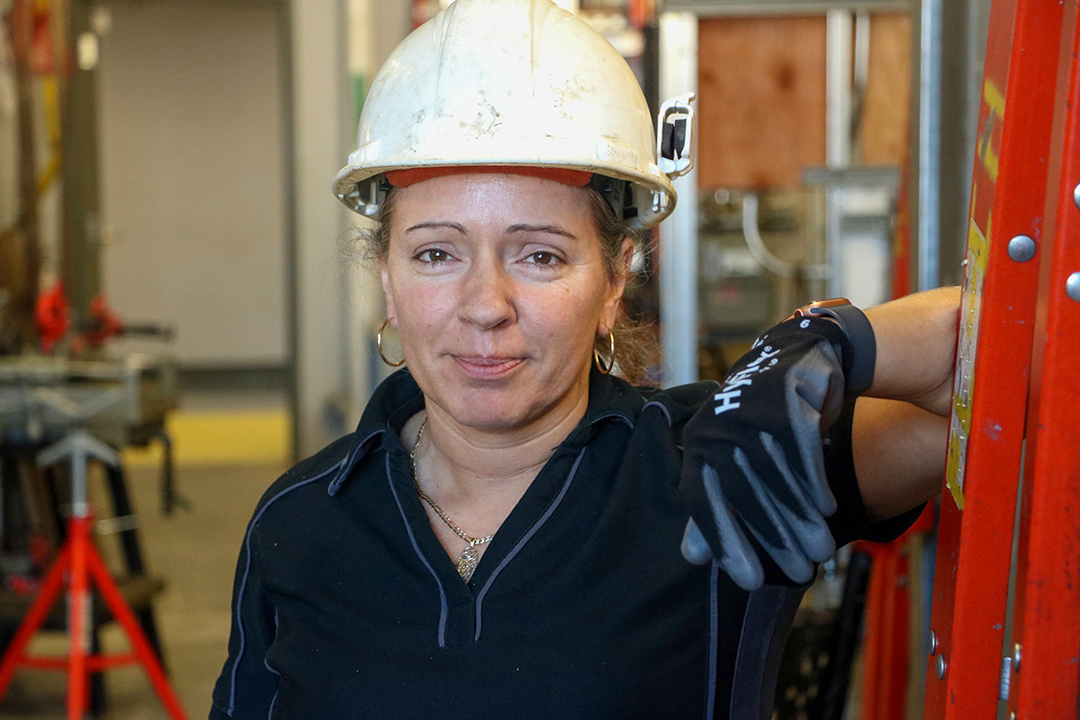 Mélanie Prévost teaches plumbing and heating at the École Polymécanique de Laval.
Mélanie Prévost teaches plumbing and heating at the École Polymécanique de Laval.A profession is considered non-traditional for men or women when one group represents less than 33%. Emploi-Québec has indexed over one hundred traditionally male or female occupations. Plumbing and heating is a typical profession where women are almost entirely absent. In the 90s, when Mélanie was 18 years old, she was the only young woman among twenty or so men studying the trade. “At first, no one in my entourage believed in my project,” she recalls. “But I decided to carry on. My primary goal was to develop as many skills as possible. I used my resourcefulness, and I succeeded. In my profession, we not only repair heating devices and install pipes; we develop a multitude of technical skills and have a basic knowledge of everything, which makes us really versatile. Today, I can repair anything that breaks in my house.”
Specialization and Job Market
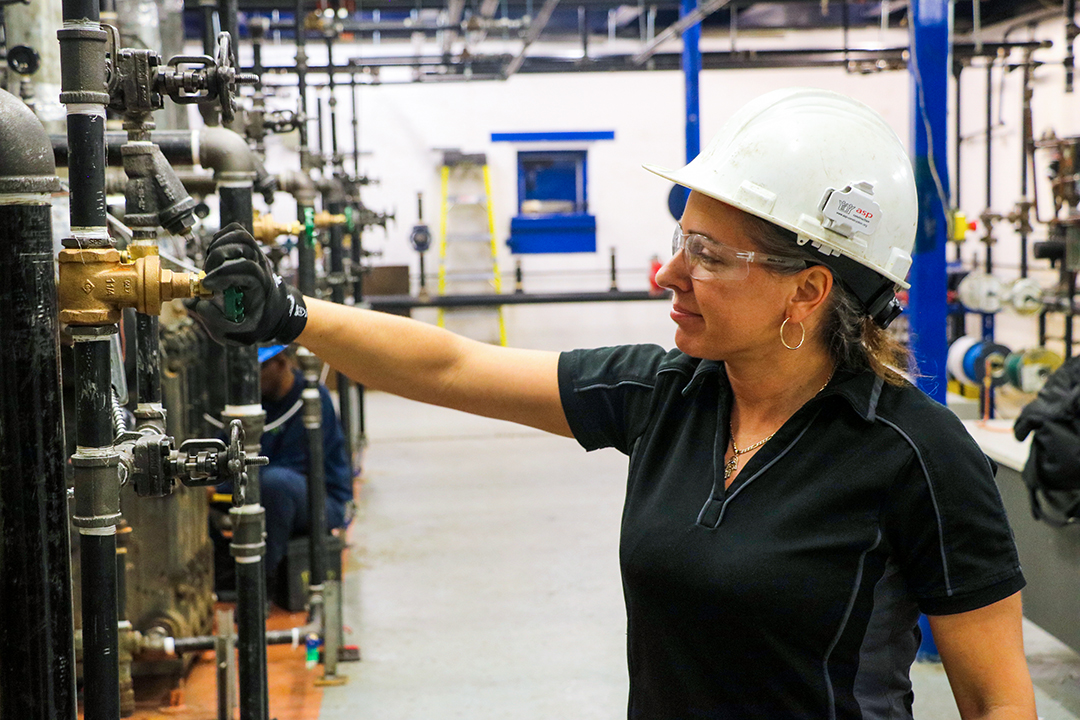 A profession is considered traditionally male-dominated when women represent less than 33%. Women represent less than 1% of plumbers.
A profession is considered traditionally male-dominated when women represent less than 33%. Women represent less than 1% of plumbers. Mélanie Prévost chose this profession because she wanted to acquire diverse skills and become versatile. But more importantly, she chose a sector where she was sure there would be no shortage of work. As a reminder for our younger readers, she started her education during a recession in the early 90s, when unemployment was nearing 12% in Canada.
She admits that her petite five-foot frame was not considered ideal for working in her field, especially since she had almost no manual skills and toolboxes could weigh up to thirty kilos. However, her zest for life, resourcefulness, and eagerness to learn more than made up for what she lacked in size.
In plumbing and heating, there are two specialties. Mélanie Prévost chose to focus on heating: oil, warm-air, and hot-water heating systems are no mystery to her. She finished her program in 1995 at what is known today as the École des métiers de la construction de Montréal (EMCM) before beginning her career working for major oil companies. “I was alone in my truck, going on different service calls. Whatever the problem was, I had to fix it, and it had to work.”
When she was starting out, the young woman would visit clients to adjust their heating systems. “During my first visits, some clients would see me arrive, then look over my shoulder, as if waiting for my father to show up,” she recalls with a laugh. “That was an interesting reaction, but clients eventually got used to me.”
"In my profession, we not only repair heating devices and install pipes; we develop a multitude of technical skills and have a basic knowledge of everything, which makes us really versatile."
A New Direction
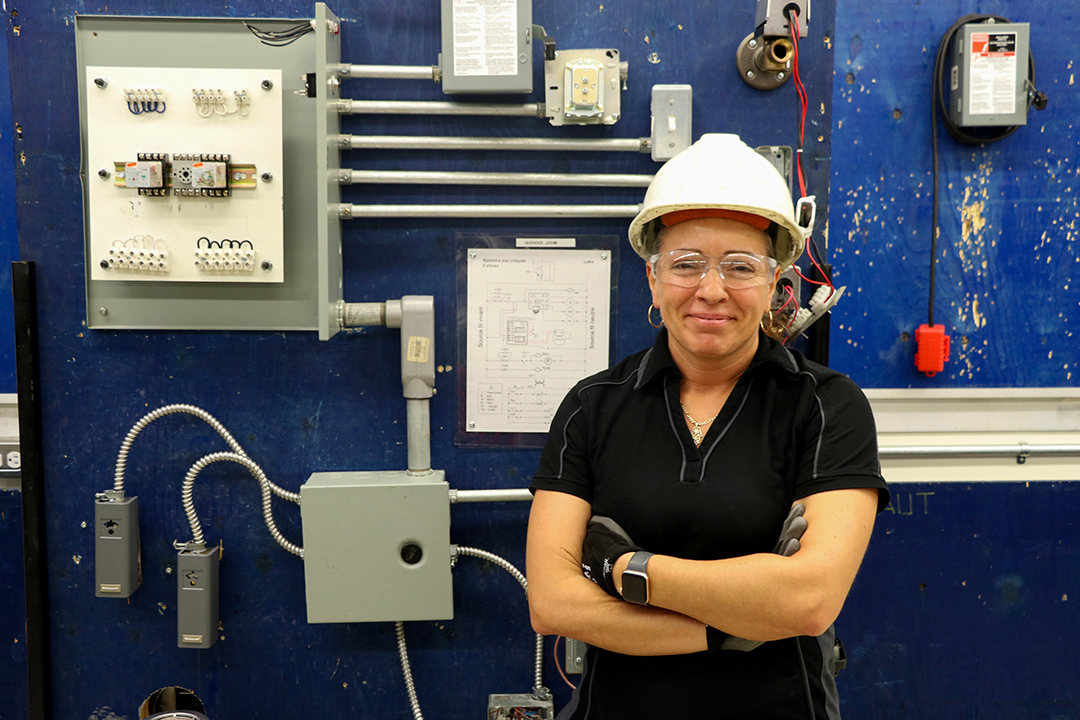 Trailblazer Mélanie Prévost is also the Heating expert at the Olympiades québécoises des métiers et des technologies.
Trailblazer Mélanie Prévost is also the Heating expert at the Olympiades québécoises des métiers et des technologies.Having to work evening shifts, nights, during Christmas and other holidays pushed her to consider a career change. “When you work in heating, the schedule is a major inconvenience unless you are in the construction sector. Heating systems can break anytime, and heating problems wait for no one!”
Mélanie worked for the municipality for a few years as a pipe fitter, but when she could not secure a permanent position, she turned to teaching. “I had gained so much diverse experience over twenty years or so, and I wanted to stimulate my “intellectual” side.” As a teacher, Mélanie also feels like she is helping mold the next generation. Once again, Mélanie has proved she is a pioneer, as only three women are practicing this profession in all of Québec. “In a way, I paved the way for some women. In plumbing and heating, women are in short supply. We can count them on one hand.”
The Skills Adventure
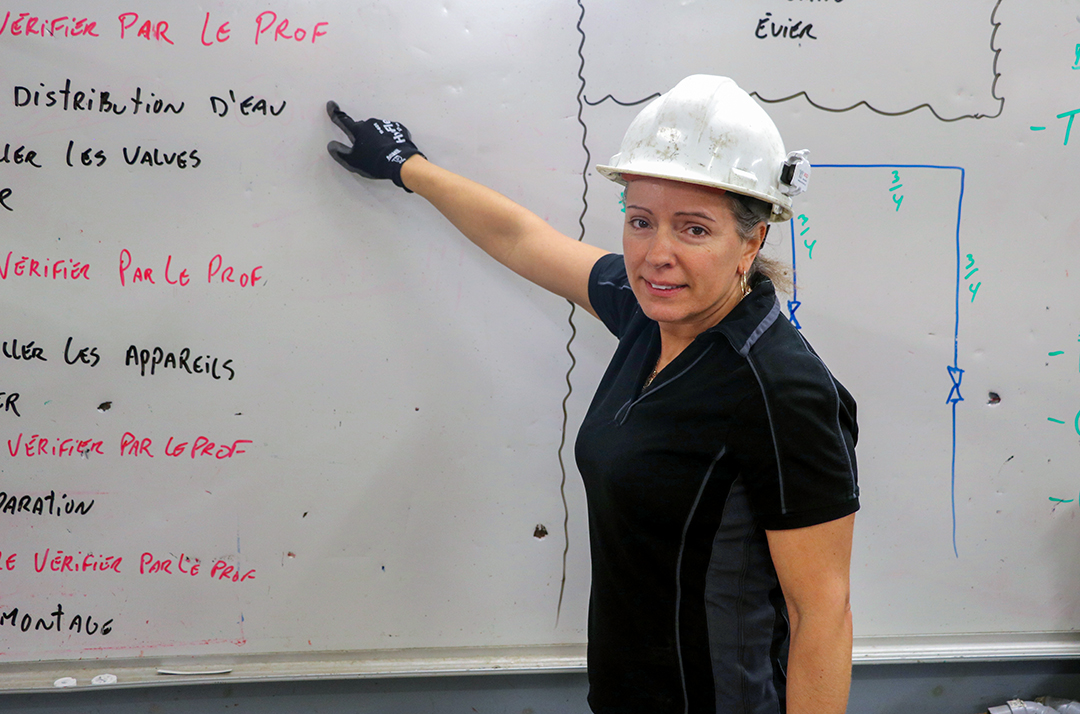 In 2011, as a trainer, she reached the final stage of the Skills process by attending the WorldSkills International Competition in London.
In 2011, as a trainer, she reached the final stage of the Skills process by attending the WorldSkills International Competition in London.Mélanie is a teacher at the École Polymécanique de Laval and joined the Skills movement in 2008. “I have trained students, been a workshop manager, and been a judge. I have been involved in a bit of everything,” she summarizes. Her best memory? When her competitor, Maxime Piché, made it to the WorldSkills International Competition in London back in 2011. “It makes you so proud to see young students evolve, and we do all this for them.”
Recently, Mélanie approached Compétences Québec to propose a new discipline for the Québec Skills Competition in Heating. She is now the expert in this skill area and must set up everything so that participants can compete in this trade that she is so passionate about. “Quite a challenge!” she admits.
As a teacher, Mélanie also feels like she is helping mold the next generation. Once again, Mélanie has proved she is a pioneer, as only three women are practicing this profession in all of Québec.
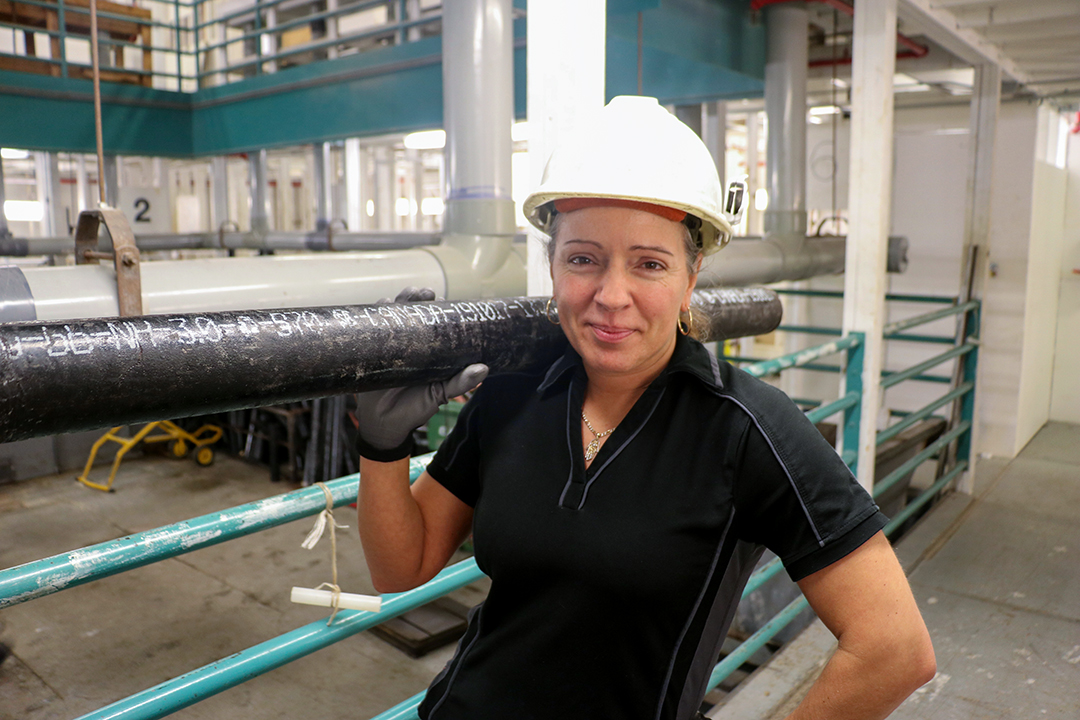 This teacher believes the trade has changed tremendously, and it is important to continue promoting it, especially among women.
This teacher believes the trade has changed tremendously, and it is important to continue promoting it, especially among women.For twenty-five years now, Mélanie has been navigating a traditionally male-dominated profession. While jokes and the shock of some customers at seeing a woman arrive might have discouraged her, on the contrary, she hopes to see more women pursuing this profession. “I think that women believe plumbing and heating are physically demanding, and it stops them from pursuing it. We need to keep promoting it because this trade has evolved tremendously. With the tools now at our disposal, it is not as hard as it once was. You just have to learn to use the tools correctly. And women are an asset in the workplace.”
“I think that women believe plumbing and heating are physically demanding, and it stops them from pursuing it. We need to keep promoting it because this trade has evolved tremendously."
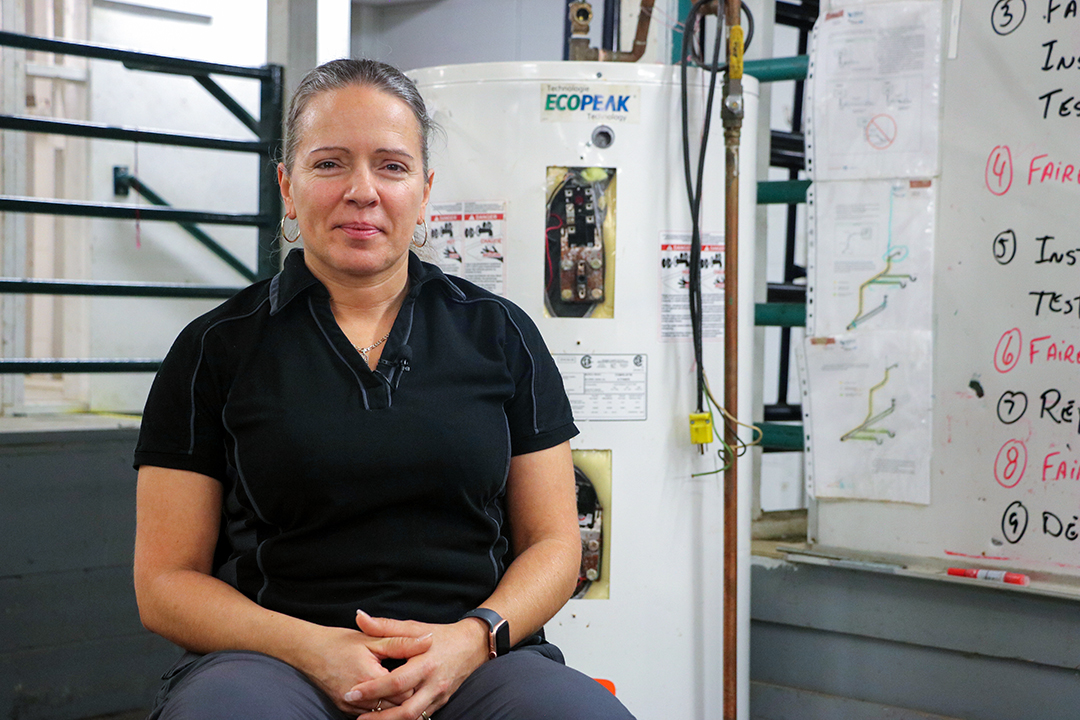 Gender diversity in the workplace adds value and makes it possible to fill labour shortages, amongst other benefits.
Gender diversity in the workplace adds value and makes it possible to fill labour shortages, amongst other benefits. According to Extra Ressources, gender diversity in the workplace has many benefits, such as diversified work methods, responding to labour shortages, and combining the complementary strengths of men and women.
Mélanie also believes that to be happy in this field, you must be resourceful and know how to take your place…without taking up too much space. “You have to be willing to surpass yourself. Personally, I think I have had a great career, and I have been lucky. You earn respect from the start if you are a hard worker and develop good professional qualities. Also, you must be open to getting teased once in a while. Don’t people always say that we tease those we like?”
